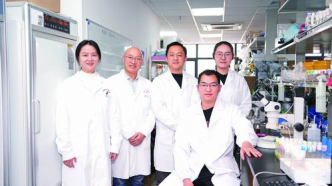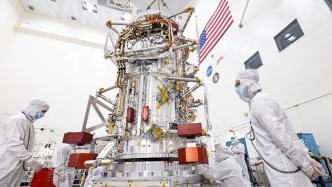
There is a knowledge point in high school biology textbooks: there is an important regulatory hormone in the human body-antidiuretic hormone. It can act on the kidneys, increase the reabsorption of water by the kidneys, reduce the excretion of water in the form of urine, and has a basic role in regulating body fluids. In other words, antidiuretic hormone is a hormone that is very helpful to the human body and can ensure good health.
However, a latest study by scientists from Wuhan University may "update" people's understanding - scientists have discovered a brand-new antidiuretic hormone that is not only not beneficial to the human body, but is also linked to tumors.
Research by the team of Song Wei, a professor at the Wuhan University School of Medicine, and the team of Ye Xujun, an associate professor at Zhongnan Hospital of Wuhan University, revealed that a new type of antidiuretic hormone regulates renal dysfunction caused by tumors, and introduced the mechanisms related to the interaction between tumors and the kidneys. On December 7, the results were published online in Nature.
"In this study, there is no so-called 'prescient' design, most of it is a periodic coincidence." Song Wei told China Science News.

Song Wei (third from left in the back row), Ye Xujun (second from the left in the back row) and team members. Photo provided by interviewee
New findings in fruit flies
In clinical practice, tumor is a common disease. Cancer patients suffer great pain, often accompanied by loss of muscle and fat, and at the same time, various organs throughout the body are gradually destroyed, and damage to the kidneys is very fatal.
The kidney is an important organ that excretes metabolites and maintains body fluid balance. Maintenance of renal function and fluid balance is critical to various physiopathological stresses in vertebrates and invertebrates. Many patients with malignant tumors often suffer from renal dysfunction and oliguria, which hinders the discharge of body fluids and the removal of toxins, seriously endangering the body's health.
However, previous studies have mainly focused on the nephrotoxicity of antitumor drugs and tumor-related immune or inflammatory responses. There has been no reliable answer to whether malignant tumors directly target the kidneys and how they disrupt patients' physiological functions.
"We found from fruit flies that tumors can secrete a hormone that prevents the kidneys from draining water and detoxifying, leading to kidney damage," Song Wei said. Drosophila is a model organism and an ideal model for related research. Previously, the team used Drosophila to induce malignant tumors and transplant foreign tumors, revealing the cancer-related pathogenic mechanisms.
Based on this new discovery, the research team began to explore further.
First clear antidiuretic hormone
Although the fruit fly is small, it has all five internal organs. Many of its organs are functionally the same as those of humans. Nearly 10 years ago, Song Wei, who was still working as a postdoctoral researcher at Harvard Medical School in the United States, conducted relevant scientific research using fruit flies.
Reabsorption of water by the kidneys occurs through the renal tubules. Transport of water molecules by renal tubular epithelial cells occurs in different species, including humans and Drosophila, and is regulated by hormones. Both humans and Drosophila have a variety of diuretic hormones that promote drainage, but research on their counterpart, antidiuretic hormones, is very limited. Previously, antidiuretic hormone had not been found in fruit flies.
To address these issues, the research team identified the first antidiuretic hormone in Drosophila, the F subtype ion transport peptide, through a conserved Drosophila tumor model and high-throughput in vivo screening, and revealed that it is involved in malignant tumors and intestinal Secreted by endocrine cells, it directly acts on the Drosophila Malpighian ducts (similar to kidney tubules) to destroy their drainage function, leading to severe accumulation of body fluids. "This is the first clear antidiuretic hormone found in fruit flies or even insects." Song Wei said.
Combining the clinical experience and animal model research of the other co-corresponding author of the paper, geriatrician expert Ye Xujun and his team, they identified a new anti-diuretic pathway that is cross-species and broad-spectrum, mediates the interaction between tumors and kidneys, and provides a basis for cancer-related Renal dysfunction provides new therapeutic targets.
"Try your best" to promote "luck"
"To be honest, the entire research process was about taking one step at a time, without much foresight. At the beginning, we didn't know how far we could go," Song Wei said.
As the research progressed, Xu Wenhao, the co-first author of the paper and a doctoral student in the team, and postdoctoral fellow Li Gerui, as well as co-authors and doctoral student Chen Yuan, and others continued to cross the river by feeling for the stones.
From the beginning of the research, Xu Wenhao and Chen Yuan spent more than a year establishing transgenic fruit fly strains and selecting suitable fruit flies. Xu Wenhao hypothesized that tumors may produce certain secreted proteins targeted at the kidneys, thereby damaging kidney function and causing ascites accumulation. By screening more than 100 related proteins in tumors, he discovered the important role of antidiuretic hormone. In addition, he and Li Gerui conducted a comprehensive study on the different isoforms of antidiuretic hormone and successfully transferred mammalian-related genes into Drosophila for the first time.
During the transformation stage from fruit flies to mouse models, Xu Wenhao and Li Gerui verified almost all mouse models of tumor-induced consumption at home and abroad, and independently explored three human solid tumor implantation mouse models. It took them more than three years to establish that a similar antidiuretic pathway exists in mice and mediates tumors to destroy kidney function.
"The students and postdocs worked very hard and invested a lot of time and energy." Song Wei said that the hard-won results did not include much "wisdom" but more luck and practicality. "No one has done this research, and there is almost no reference. We can only think of ourselves as 'stupid' and do more solid research."
"There are a lot of unresolved problems in the field of kidney research, and there are still many things worth exploring." Ye Xujun said.
Related paper information:
https://doi.org/10.1038/s41586-023-06833-8
(The original title is "This research will "update" the knowledge points of high school textbooks")


